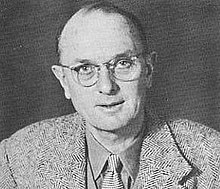
Christopher William Clayton Hutton (16 November 1893 – 3 September 1965) was a British soldier, airman, journalist and inventor. Hutton is best known for his Second World War service with MI9, a secret branch of the British Directorate of Military Intelligence.[1][2][3]
From the end of 1939 until 1943, Hutton worked in MI9 under Norman Crockatt. MI9 was created to design and distribute escape and evasion aids for Allied servicemen, and to help servicemen return to Allied territory after escaping. Hutton's team identified suitable manufacturers for escape and evasion equipment and devised methods by which such aids could be sent to prisoner of war camps. Many prisoners' escapes were assisted by MI9's silk maps and other escape and evasion equipment.[4]
Hutton's wartime escape and evasion work required him to account for shortages of materials such as silk and steel wire.[3] He was often in trouble with the police and with official supply authorities but was supported in these matters by Crockatt. Facing financial difficulties after WWII, Hutton wrote a book, Official Secret, about his wartime experiences. He faced government opposition to his attempts at publication due to the concern of his work revealing sensitive information but was eventually able to publish in 1960.
- ^ Hutton, Clayton. Official Secret - The remarkable story of escape aids, their invention, production and the sequel. Max Parrish, London, 1960.
- ^ Hutton pp. 1-12
- ^ a b Foot, M. R. D. (2008). "Hutton, Christopher William Clayton". Oxford Dictionary of National Biography (online ed.). Oxford University Press. doi:10.1093/ref:odnb/73035. (Subscription or UK public library membership required.)
- ^ Cite error: The named reference
escapewas invoked but never defined (see the help page).